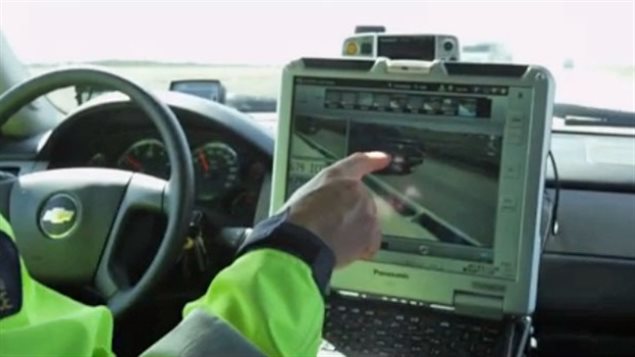It’s called Automatic Licence Plate Recognition (ALPR) technology. What it does is scan vehicle licence plates and compares that to a central data base and if a particular plate is being sought by a police or parking agency, it scores a “hit”. The system can operate at night, and on crowded highways at high speed, and can record thousands of cars an hour.
Police use it to search for stolen vehicles, or to find people reported to be drunk driving for example, or driving under suspension and so on. In an increasing number of areas, parking control agents use it to detect people who haven’t paid for parking.
It also registers all plates, and exactly where and when the car was when scanned.
With news of governments collecting more and more so-called “meta-data”, the fact that another method of tracking people and their movements and what is done with that information, how long it’s stored and who sees is it becomes an increasing issue of concern for civil liberties and privacy groups
They note there seems to be a lack of control as the policies of those who collect it, vary widely.
Some jurisdictions in Canada wipe the “non-hit” information daily, others keep it for much longer, up to several years. Some parking authorities share the data willingly with police, others require a warrant.
“ The technology is becoming a “mass surveillance” tool and demands better oversight, said Christopher Parsons, a post-doctoral fellow at the University of Toronto’s Citizen Lab specializing in technology and privacy issues.
He is further quoted in Postmedia News saying, “It doesn’t matter that there are positive intentions behind this. It’s a surveillance system”.
This is especially so as more and more police and parking authorities increase the number of vehicles equipped with the scanners.
Back in 2012, the privacy commissioner in the west coast province of British Columbia wrote in a report that, “Collecting personal information for law enforcement purposes does not extend to retaining information on the suspicionless activities of citizens just in case it may be useful in the future”.
In the US, the Department of Homeland Security had to abandon plans for a national licence plate tracking system over privacy concerns. They had planned to use data from police and commercial trackers to find fugitive illegal immigrants.
Some US commercial businesses have sprung up selling information from databases of scanned licence plates to private investigators, insurance companies, banks and others.
In 2012, civil liberties groups expressed concern that the US government was sharing scanned plate data with the National Insurance Crime Bureau. The NICB is a group which includes almost all US insurance companies.
The US Customs and Border Protection scans every plate at the border and while it says it doesn’t send the information to Canadian insurance companies, it is allowed to share data “with other federal, state, local and international investigating agencies and other organizations engaged in theft prevention,”







For reasons beyond our control, and for an undetermined period of time, our comment section is now closed. However, our social networks remain open to your contributions.